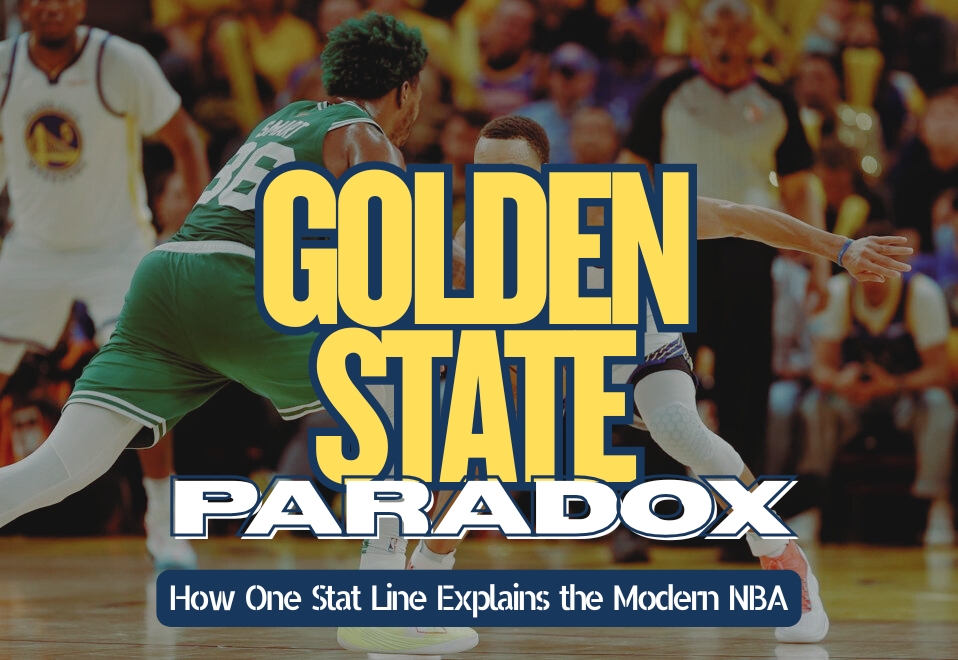Golden State Paradox: How One Stat Line Explains the Modern NBA

Over the past decade, the Golden State Warriors defined an era of NBA basketball. They won four championships, revolutionized the game with Steph Curry’s shooting, and featured one of the greatest defenders of his generation in Draymond Green.
But here’s the stat that will make you look twice: from 2015 to 2024, no NBA team scored more points than the Warriors… and no team allowed more points either.
It’s a paradox that raises a bigger question about today’s NBA: Does raw defense even matter anymore?
Golden State’s Offensive–Defensive Paradox
Golden State were simultaneously the league’s most explosive offense and its busiest defense over the past decade.
Golden State Warriors Points (2015–2024)
| Category | Total Points | League Rank |
|---|---|---|
| Points Scored | 105,638 | 1st |
| Points Allowed | 101,502 | 1st |
On paper, it looks like a contradiction: the Warriors dominated behind Draymond Green’s defense, yet still gave up more points than anyone else.
Why Pace Skews the Numbers
Golden State’s style under Steve Kerr wasn’t just about three-point shooting — it was about tempo. Every possession was a sprint. And every sprint created more chances on both ends of the floor.
They played fast, moved the ball relentlessly, and turned every game into a track meet. More possessions meant more shots for Curry and Klay Thompson… but also more opportunities for opponents to score.
The Warriors didn’t have a bad defense. They had a busy defense.
The NBA’s Scoring Boom
The Warriors’ paradox is really the NBA’s paradox. League-wide scoring averages have surged across the past decade, driven by faster pace, higher efficiency, and more possessions.
League Averages (per season)
| Season | Pace | Off. Rating | PPG |
|---|---|---|---|
| 2004–05 | 90.1 | 106.1 | 97.2 |
| 2014–15 | 93.9 | 105.6 | 100.0 |
| 2023–24 | 100.7 | 115.3 | 115.3 |
- Pace = possessions per 48 minutes
- Off. Rating = points per 100 possessions
- PPG = average team points per game
Together, these averages show how the NBA’s scoring environment has shifted — teams are playing faster, scoring more efficiently, and putting up the highest totals in modern history.
Organized Chaos Isn’t New
Golden State aren’t the first great team to thrive in organized chaos.
- Showtime Lakers (1980s): Magic Johnson’s Lakers played at a blistering pace, often ranking high in both points scored and allowed. They won five titles proving pace doesn’t kill defense — if efficiency holds.
- 2004–2007 Suns: Steve Nash’s “Seven Seconds or Less” Suns thrilled fans with scoring but lacked balance. Their offense was historic, but without enough defensive backbone, they came away ringless.
- 2010s Rockets: James Harden’s Rockets lived by the three, ranking near the top in points scored and points allowed. Unlike Golden State, they never had the defensive glue to finish the job.
The Warriors simply perfected what others tried: build an unstoppable offense, pair it with a defense that’s efficient (if not stingy), and ride it to titles.
Efficiency vs. Raw Totals
Raw totals like “points allowed” can be misleading. Efficiency stats — such as Defensive Rating (points allowed per 100 possessions) — tell the real story. Take the 2018–19 season:
| Team | Points Allowed per Game | Defensive Rating (Rank) |
|---|---|---|
| Warriors | 111.2 (20th) | 108.5 (11th) |
| Kings | 114.2 (28th) | 112.6 (26th) |
| Bucks | 109.3 (11th) | 104.9 (1st) |
The Warriors gave up the 20th-most points per game, but were a respectable 11th in defensive efficiency — perfectly adequate when paired with the league’s best offense.
Does Defense Still Matter?
So does defense still win championships? The evidence says: yes, but not in the way fans might think.
- Warriors Dynasty (2015–2019): Elite offense, good-enough defense.
- 2014 Spurs, 2021 Bucks: Two-way balance was crucial.
- 2023 Nuggets: Offensive juggernaut with timely stops when it mattered.
The key isn’t stopping every possession. It’s being efficient enough — and dominating offensively when the game speeds up.
Conclusion
The Warriors’ dynasty is a case study in how the NBA has changed. They scored more than anyone, they gave up more than anyone, and they still won more than anyone.
So next time you see a stat about “points allowed,” ask yourself:
- Is it really proof of a weak defense?
- Or is it just the cost of playing at warp speed in an era where everyone scores more?
After all, Draymond Green — a one-time Defensive Player of the Year and nine-time All-Defensive Team member (including 5 First Team selections) — built his Hall of Fame case while anchoring a team that, on paper, was the league’s leakiest defense.
Golden State’s scoring paradox isn’t a flaw — it’s the blueprint for winning in the modern NBA.